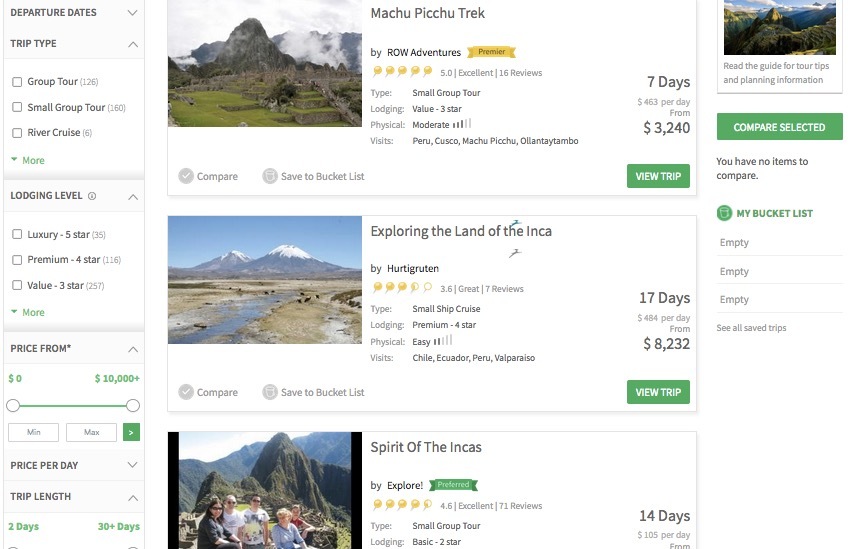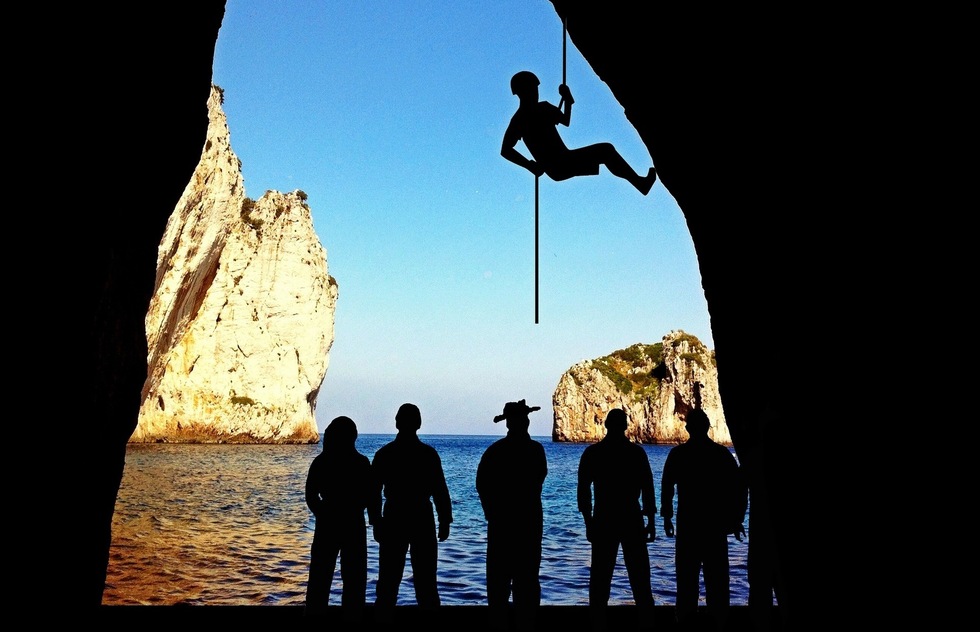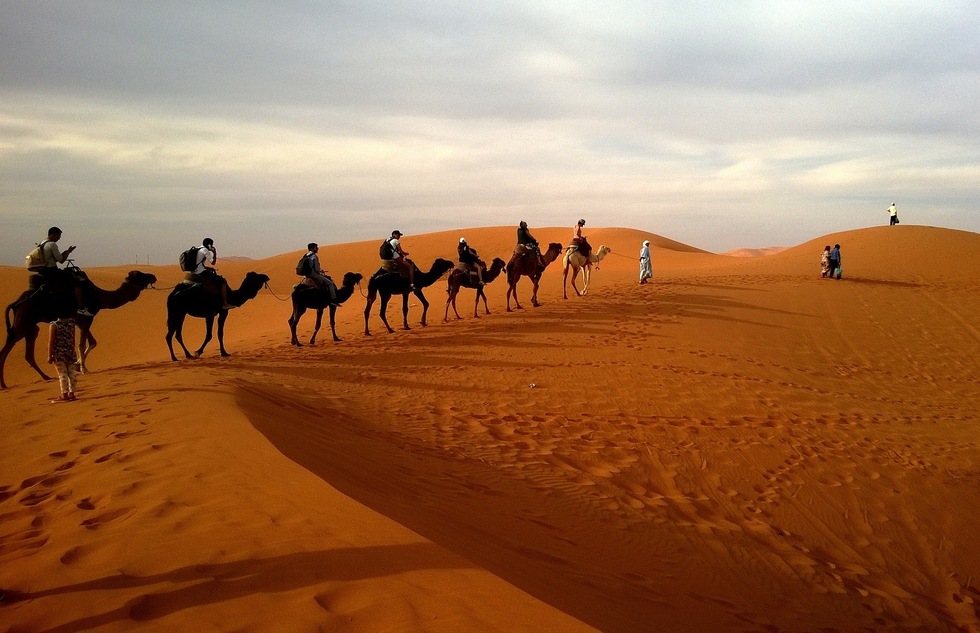How to Pick the Right Tour Company For You
By Pauline Frommer
Finding the right tour company shouldn’t be as difficult as it is. But multi-day tours are complex. Their success depends on a number of factors: the talents of the guide(s), the logic of the itinerary, the quality of the hotels and included meals, the choice of transportation, the various types of activities, and the mix of people in the group. This may be why the Expedias and Pricelines of the world have yet to sell this type of vacation: They have too many moving parts to fit easily into a booking widget.
We're here to help. Drawing on our decades of expertise, we can introduce you to brand new resources for finding tours, and help you know the questions you should be asking tour companies—and yourself—before you book.
We're here to help. Drawing on our decades of expertise, we can introduce you to brand new resources for finding tours, and help you know the questions you should be asking tour companies—and yourself—before you book.
Try an online tour marketplace
To compare tours easily, head to one of these two websites: TourRadar.com, or TravelStride.com. Each lists dozens of companies and hundreds of tours, and each does so side-by-side so that consumers can easily compare. TourRadar drills down geographically to help you focus on the specific regions you'll be visiting; instead of listing every tour in Italy, for example, it allows you to search only for Tuscany, Sardinia, or the Amalfi Coast. Travel Stride excels at the social side of touring. It's the only one of the three to have filters for solo-friendly trips and women-only vacations.
The perks of using these marketplaces
Tours no longer mean 40 people cramming onto a motorcoach and driving from one iconic sight to the next. Browse TravelStride or TourRadar and you’ll find a mind-boggling variety. Not only are there hundreds of safaris, bike tours, and walking tours to pick from, but there are also group trips just for those under 35 or older than 60; tours centered around festivals or hobbies such as cooking, motorcycling, and birding; and self-guided tours, where you'll be mostly on your own with discreet support along the way. And with the first two websites, you'll see listings from smaller mom-and-pop tour companies, which may only run tours in the area they're based and thus have potentially greater expertise. The local tour companies are sometimes less expensive, too.
Question 1 to Ask Yourself: Who Will I Be Traveling With?
This can make or break your vacation. Alas, you can’t choose the people with whom you’ll be sharing your hard-won vacation time, but you can look at the types of folks who historically book with these companies. You’ll find an over-50, all-American crowd with Globus, Cosmos, Overseas Adventure Travel, Trafalgar, Grand Circle, Perillo Tours or Rick Steves Tours (unless you book a specialized family trip). Companies like Intrepid, Djoser and G-Adventures tend to have a broader age range and an international clientele—Intrepid is Australian, Djoser is Dutch (but conducts its tours in English), and G-Adventures is Canadian. If you don’t know what the customer demographics might be, ask. Most companies will be upfront with this type of information.
Question 2: How Many People Will I Be Traveling With?
The mass-market tour companies tend to have, yes, massive groups—up to 60 souls aboard a bus, along with one tour director, is the standard. But that model seems to be falling out of fashion and companies that have emerged in the last two decades often cap the number of participants at 12 or 20. I far prefer the smaller tours. With larger groups, the simple act of herding people eats up valuable time. You’ll see less in the course of a day but spend just as much time out of your hotel. And the larger the group, the greater the chance someone in your group will be difficult (the perpetually late one, the complainer, the smarter-than-the-guide one).
Question 3: Where do we eat?
Purchase a group tour and you can rest assured that some sightseeing, all hotels (or other accommodations), and some, if not all, transportation will be covered. But what the rest of the package includes will vary greatly company to company.
My counter-intuitive advice: often the less that’s covered, the more you’ll enjoy the trip. That’s certainly the case for meals. The food is usually lousy on all but the most expensive group tours because participants are stuck eating at tourist restaurants and chain hotel restaurants. Better restaurants are too popular with locals to need to take 40, or even 20, diners at a time on a regular basis.
My counter-intuitive advice: often the less that’s covered, the more you’ll enjoy the trip. That’s certainly the case for meals. The food is usually lousy on all but the most expensive group tours because participants are stuck eating at tourist restaurants and chain hotel restaurants. Better restaurants are too popular with locals to need to take 40, or even 20, diners at a time on a regular basis.
Question 4: Will I get free time?
Some firms include only half-day tours as a way of upselling customers on optional afternoon and evening tours. These are almost always overpriced. But that doesn't necessarily mean you should write off these companies. The savvy traveler uses the free time to explore on her own, giving the trip a nice balance between group and solo activities. (The only caution: if the tour takes you to the secondary sights but upcharges to go to the iconic places, don’t book. It's clear they don't have the travelers' best interests in mind.)
All of this advice goes out the window for safaris and other nature tours. In areas where you need the services of a guide to stay safe and understand what you're seeing, you'll want to look for the most inclusive tour available.
All of this advice goes out the window for safaris and other nature tours. In areas where you need the services of a guide to stay safe and understand what you're seeing, you'll want to look for the most inclusive tour available.
Question 5: Who/what takes priority, the bus or me?
The dirty little secret about group bus tours is that the motorcoach's needs often come first. In European cities with narrow streets, for example, group tour participants sometimes find they're sleeping well out in the suburbs, because that's the only hotel with a bus-sized parking lot. Go to countries with strong labor laws, like France, and you may discover that the number of hours of sightseeing allowed per day is curtailed by the amount of time the bus driver can work—good for safety but bad for maximizing time. If you want to have the opportunity to do some exploring on your own, make sure that your hotels are in the center of the action.
Question 6: Who are the guides?
We're spilling all the touring secrets today, and this is a big one: Most of the major tour operators don't hire or train their own guides. Instead, they use whomever is available from the pool of local guides that day. So you could be paying three times as much as someone on a cheaper tour, but still get a guide who works for both companies. And while some local guides are terrific, others will be mediocre. In general, the sightseeing experience will be better with operators that hire and train their own local guides, so when shopping around, ask how they get their guides.
When I say "guides" I'm talking about the people picked up on a per-day basis to expound upon the history and culture of the spot being visited. On some tours, the tour leader, who is the person who sticks with the group no matter where it goes, may also act as the daily guide. In those situations, make sure the tour leader is a local so that you know you're getting the inside scoop on the destination.
When I say "guides" I'm talking about the people picked up on a per-day basis to expound upon the history and culture of the spot being visited. On some tours, the tour leader, who is the person who sticks with the group no matter where it goes, may also act as the daily guide. In those situations, make sure the tour leader is a local so that you know you're getting the inside scoop on the destination.
Question 7: Are there extra fees and expenses?
Fees come in many forms. Some tour companies have the gall to include a tour of a museum or national park but expect travelers to pay the entrance fee on the spot. Others feed you a basic meal but charge more if you wish to switch to the deluxe (read: palatable) menu. And on most tours, you'll be expected to tip the tour director, the daily guides, and the bus or van driver (if there is one). Be sure you add in all of these potential extra expenses when you're comparing tours.
One more note on pricing: many consumers assume that a tour will be more cost-effective than independent travel. That's rarely the case, so if you've decided on this type of vacation do crunch some numbers first. You can usually beat the cost of a tour with careful planning.
One more note on pricing: many consumers assume that a tour will be more cost-effective than independent travel. That's rarely the case, so if you've decided on this type of vacation do crunch some numbers first. You can usually beat the cost of a tour with careful planning.
Question 8: Does the itinerary seem logical?
Every day you spend getting somewhere is pretty much a lost day. So if you're on a tour that promises five countries in six days, you're going to be spending too much of your time traveling and not enough time enjoying your vacation. Also look for a balance of sights and activities. A good tour will take you to both historic sights and places of contemporary interest, to both nature areas (or at least outdoor areas) and museums.
Question 9: How managed will I be?
It's the first morning of your vacation and your hotel phone rings, with a wake up call you didn't request. It was set by your tour leader, without your permission, and the entire group got one because that's the kind of tour this is. They make you don a badge identifying you as a member of the tour (required), and you spend the day marching behind a person carrying a closed umbrella or flag high above their head. You've been "grouped". Some people enjoy this type of solidarity, while others bristle. Before you book, ask about badge wearing, automatic phone calls, and the other hallmarks of group tours. You'll be surprised how much these seemingly small rituals can shape your trip.
Question 10: How "green" is the tour
A number of companies now run tours that only make use of local transportation to lessen their carbon footprint. These same outfits tend to put up travelers in locally owned guesthouses rather than multinational chains, supporting the economy in the destination. Others will donate a portion of the tour fee to charitable organizations. Bottom line: It is possible to allow your value system to lead in the decision of which group tour to take.
Question 11: Will I be "shop steered"
Unfortunately, guiding is not a very well-paid profession. So some guides supplement their income by steering their groups into stores where they’ll get a commission for every item sold. I don’t want to begrudge the guides this bit of extra cash, but too often the tour takers are rushed through the sites they specifically traveled to see in order to make time to dawdle in a gift shop. You can spot these types of tours if shopping stops and "factories" are listed in the itinerary. The one exception to this rule would be culinary tours, where these types of stops make sense.



















